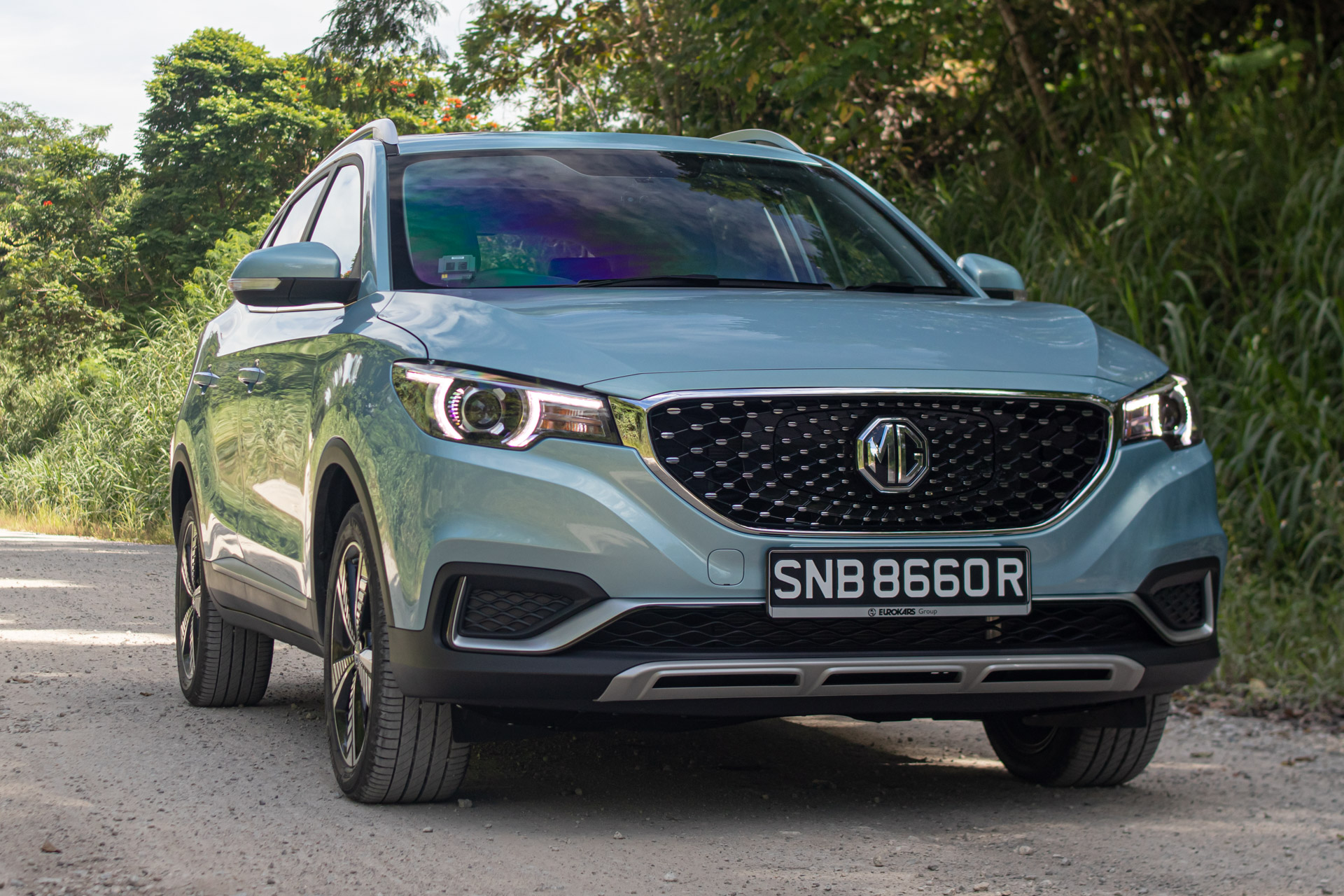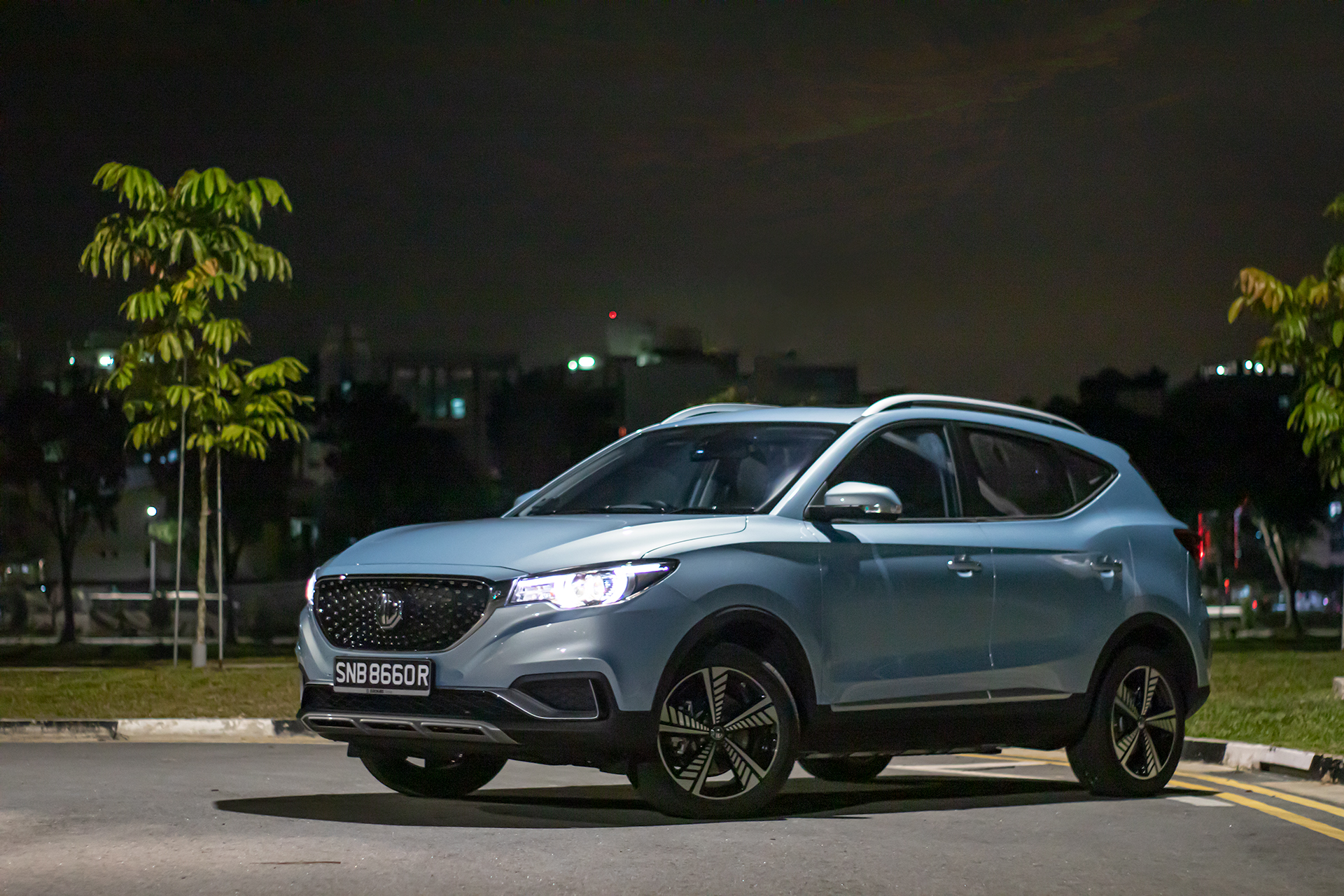2021 MG ZS EV review: Almost hitting the mark

We are living in the dawn of a new era of motoring. The establishment (i.e internal combustion) is being increasingly vilified, scrutinised and gradually made unpopular.
With the impending demise of propulsion through the use of dinosaur juice, comes the ascension of mobility via the humble electron. We are experiencing this EV adoption en masse, if not regulatory, at very least at a manufacturer level.
At present, there seems to be an ongoing arms race amongst car makers to see who can come up with the most compelling EV package to capture an early market dominance.
One of the aforementioned manufacturers would be the newly-revitalised MG.

... probably. MG, as we know it today, can trace its roots back to the original MG Rover group, which went bust back in 2005.
Shanghai Automotive Industry Corporation, better known as SAIC, bought the rights to the MG brand and remaining assets to form MG Motor, a fully owned subsidiary of the SAIC Group.
This "new" manufacturer, which really only shares its name with the original MG brand, has actually been around since 2006. So "new" manufacturer it perhaps isn't?
They may have been around for the best part of a decade and a bit, but it still doesn't detract from the fact that it is their current line-up of cars that have received worldwide acclaim.

When you're styling something for global consumption, and it is your first proper go at doing so, it perhaps isn't a bad idea to get some inspiration from examples that already sell in decent numbers.
Coincidental or not, the MG ZS EV seemingly borrows cues from various other automakers. There's more than a hint of Mazda's Kodo design language in the front fascia of the car. The profile reminds us of a good mix of a previous generation Jaguar, with just a touch of Bentley.

The old Jag hommage seems to continue into the rear of the vehicle.
With homogenisation comes the real risk of styling a generic vehicle. You really run the risk of making your end product appear as though it was designed by a video game maker to skirt copyright and trademark laws.

But unlike in said virtual world, where the cars look awkward and misshapen, the MG ZS EV combines all the elements in a restrained and proportionate fashion, for a refined, smart-looking and handsome vehicle.
It really is a breath of fresh air in a world where mainstream crossovers are increasingly being overstyled, seemingly for the sake of it.
We'd thought to address this in a section of its own. Yes, the MG ZS EV is built in China. And no, it isn't as comically and as stereotypically bad as you'd think.
Externally, panel gaps are good all around, with virtually no significant discrepancy dimensionally. There also appears to have been some thought put into the overall user experience.

For instance, the charge port resides underneath a spring-loaded and upwards-hinging trap door. Push on the badge, lift the flap out of the way, and you have access to the CCS charger that lives upfront.
Paint match across the different materials seem to be spot on too. But that isn't to say that the car is free from suspect material and component choices.
Where things start to border on iffy though, is on the inside. Again, the design inspiration continues here, with more than a whiff of an older Porsche Boxster about the dashboard of the ZS.

Overall aesthetics are what you'd deem as acceptable. But looks aside, there's always this nagging feeling at the back of our heads that the car just doesn't feel...complete. Hear us out here.
Sure, there's a trimmed steering wheel with plenty of buttons. There's even decent space on the inside for your occupants.
However, it seems like the MG boffins have seemingly neglected a small fragment of literally every single touchpoint in the car, to the point we seriously question if this was done ironically.

Take, for instance, the dashboard itself. Whilst material quality is good up top, what borders it is hard, scratchy plastic, making for a stark visual contrast.
This pales in comparison to the other seemingly missed opportunities MG has had with the interior.
The instrument cluster is another example. It comes with analogue dials, which are fine by us, as they decimate information in a clear-cut way.
This is then frustratingly let down by an undersized, and frankly archaic screen that is used to display other critical pieces of information.

There's so little real estate here that MG had to toggle the range readouts on a separate page, which you can only trigger from a dedicated button on the centre console.
Speaking of the centre console, we give it credit for having plenty of storage options. What we will not give the car props for, is the placement of the 12V socket and its USB ports.
Rather than placing them in the logical location, MG opted to place them in the lower compartment of the centre console, just out of sight of both the driver and the passenger.

The centre console itself is needlessly engorged and tall, which means if you intend to use the armrest for its intended purpose, you probably wouldn't experience a great deal of comfort.
But the biggest bugbear of the lot would have to be the infotainment screen. It may come with Android Auto and Apple CarPlay functionality, but the graphics employed on the home screen do the otherwise acceptable looking interior a huge disservice.
If you can overlook the questionable armrests, the interior of the MG is actually a fairly comfortable place to be in.
There's decent space in the rear of the vehicle, and the flat floor means you can fit three abreast without having to wrestle over rear leg space.

There's only one USB-C charge port for the back row passengers though, so ensure your occupants have their own power banks or have fully juiced-up devices if you'd like to avoid the literal squabble for power.
Upfront, the seats, whilst basic, does offer what we'd deem as adequate support (for a crossover!) even on spirited drives, without encroaching on everyday comfort.
We'd prefer the headrest foam to be slightly softer though. The all-leather trim on the seats does a good job of making the car feel more expensive than it really is.

The panoramic sunroof was also well-received by the occupants we had in the car throughout the test drive.
Let's just say we preferred the experience behind the wheel as compared to other Asian-made crossovers of a similar size, but use petrol as propulsion.
There's no anaemic 1.5 litres four-banger mated to a CVT slushbox here; the MG's 141bhp electric motor means the car is always eager to accelerate.

To be clear, in the power-obsessed world that we find ourselves in today, 141bhp can sound inadequate in a 1.6-ton vehicle.
Bear in mind though, that there's no "power under the curve" malarky to deal with here à la a petrol engine - this is a constant 141bhp regardless of road speed.
It will comfortably outdrive similar CUVs in the bends too. As with most modern EVs, the MG's 44.5kWh battery pack lives underneath the floor of the vehicle.
Having this massive weight so low down on the ground means that the car's centre of gravity is also much lower.

The added mass requires the car to be fitted with heavier duty springs.
If these car building traits trigger a sort of dejà vu, it's because these are the same ideas that automakers use to manufacture sports cars.
Uprated shocks and well-distributed weight translates into less body roll, for greater driving enjoyment.
These traits are best experienced behind the wheel. On spirited drives, the steering feel is actually decent, provided you leave the car in either Normal or Sport mode.
Eco mode completely numbs any feedback from the wheel by over assisting it, without really presenting a significant range increase for us to recommend it.

Back to that power. In the dry, you can comfortably put this power down onto the road, even if the throttle is carelessly applied.
You'll only overwhelm the traction afforded by the rubber MG chose to shod the car with if you have put some significant steering angle on.
Whilst not as lusciously thrusty as some other EVs on sale today, the MG ZS EV will still provide a decent shove when you mash the loud pedal.
What this also translates into, is its ability to out-accelerate most commuter cars off the line, making catching gaps in traffic or filtering lanes a breeze.

Introduce some traction limitations, in the form of some rain, and the car seems to take on a different personality. You cannot simply switch off just Traction Control - when you opt to disable the driver aids, all of them are turned off at once.
With 141bhp instantly going to the front wheels, a wet tarmac surface offers insufficient grip. This will bag you a silly, wheelspin-induced grin. The wet surface only makes the car feel more urgent.
And the good news doesn't stop there.

Sure, MG claims the car will be 335km between charges. Through our testing, we've worked out our test car to have a theoretical real-world range of about 270km. Bearing in mind this was a mix of city and expressway driving, as well as some more erm...spirited drives too.
We also kept the aircon running and used the car as shade in between photoshoot sessions. In theory, we're sure there's extra range available when the car is used practically.
The MG ZS EV is proof that Chinese cars have long shaken off the comically bad build quality stereotype.
There are still areas that we'd like to see some improvements in (a more thoughtfully designed interior with some better plastics will be a good starting point).

What you get for your $148,888 is a good-looking crossover, with decent range and enough instantaneous power for an engaging drive - for a crossover-type vehicle that is.
If you can look past its imperfections, and the odd sketch material choices littered across the car, it is a really solid buy for anyone in the market for a new crossover!
For more information about the new MG ZS EV, or to arrange for a test drive, do contact MG Singapore!
|
Price: |
$148,888 |
|
Performance: |
Engine: Permanent magnet synchronous motor Power: 141bhp Torque: 353Nm Electrical energy consumption: 6.8km/kWh Range: 335km Drivetrain: Single-speed automatic; front-wheel drive Brakes: Ventilated disc (front), disc brakes (rear) |
|
Measurements: |
Wheelbase: 2,585mm Dimensions (LxWxH): 4,314mm x 1,809mm x 1,644mm Fuel rank capacity: N/A Boot capacity: 445L |
|
Features: |
Panoramic sunroof P.M 2.5 air filtration system Apply CarPlay/Android auto Keyless entry/start |
Prices are accurate at the time of writing.
ALSO READ: Audi S3 Sedan review: Forget me not
This article was first published in Motorist.